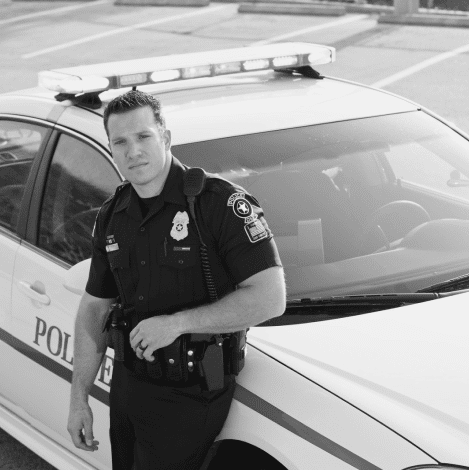Can Police Shoot a Fleeing Suspect?
Content Last Updated: March 13, 2025
Can police shoot a fleeing suspect in the back? In most cases, the answer is no — unless it is a last resort to prevent imminent danger. It is generally unlawful for a police officer to shoot someone in the back, particularly if they are nonviolent and unarmed.
According to Mapping Police Violence, police killed 1,352 people in the United States in 2023. An alarming 37 percent of those people were attempting to flee when an officer used lethal force against them. Some cases involved minor traffic stops with no allegations of violence. Others involved people shot in the back while inside vehicles.
Using unnecessary force can change a victim’s life quickly, causing severe physical damage, emotional suffering, and even wrongful death. If the actions weren’t justified, victims and their families can pursue legal claims for compensation. If you or a loved one has been the victim of this type of unjustified deadly force, contact the Police Brutality Center to learn more about your rights and legal options.
The lawyer answer to that is it depends. A police officer may shoot a fleeing suspect if that suspect is a grave danger to somebody else. So for example, if somebody is running into Times Square with a machine gun looking as if they’re going to use it on the general population, yeah, the police are going to be well within their rights to use lethal force because lethal force is being potentially used against others.
When Can Police Use Deadly Force?
The law only permits police officers to use deadly force—force a reasonable person would consider likely to cause serious bodily harm or death—in certain circumstances. The Fourth Amendment generally prohibits the use of deadly force against a non-violent, unarmed suspect who is fleeing.
Under the Justice Manual published by the U.S. Department of Justice, federal law enforcement officers may only use deadly force “when the officer has a reasonable belief that the subject of such force poses an imminent danger of death or serious physical injury to the officer or to another person.”
The Justice Manual specifically provides that officers may not use deadly force solely to prevent a fleeing suspect’s escape or disable a moving vehicle. Officers must provide a warning, if feasible, before firing. However, warning shots are not permissible.
Several states, including California, Connecticut, Illinois, Iowa, New Jersey, Ohio, and Virginia, have passed laws barring officers from using deadly force unless necessary to prevent imminent bodily harm or death. These laws are more limiting than the federal law.
Can the Police Shoot You if You Run?
Admittedly, being a police officer isn’t easy. Officers must make split-second decisions in unstable conditions. The question of whether the police can shoot you if you run has become a hotly debated issue.
Specifically, there are two justifications for an officer to shoot a victim if they run. The most common is when an officer or another person is threatened with serious bodily harm or death.
The second justification for using deadly force is when a suspect is fleeing a dangerous crime. For example, deadly force would be justified if a person had engaged in a violent crime and fled the scene, and the only way to stop them is to use deadly force.

The Fleeing Felon Rule
The Fleeing Felon Rule is a common law doctrine police once operated under, allowing them to use deadly force to stop a person known to be a felon from fleeing a scene, even if they did not immediately threaten the officer or others. This rule, however, was challenged and found to be unconstitutional in the landmark 1985 case Tennessee vs. Garner.
The case involved a Memphis, TN, police officer who arrived at the scene of a burglary call and observed Edward Garner fleeing from the residence. The officer was “reasonably sure” Garner was unarmed and ordered him to stop. As Garner attempted to climb a fence, the officer shot him in the back, killing him.
The officer indicated he based his actions on state statute, which allowed him to use “all the necessary means to affect the arrest.” In evaluating the use of force under the Fourth Amendment, the U.S. Supreme Court disagreed that this was a reasonable action. It held that “a police officer may not seize an unarmed, non-dangerous suspect by shooting him dead.”
The Supreme Court also discussed situations where deadly force would be legal in apprehending a fleeing suspect. It indicated several permissible situations:
- Where the officer has probable cause to believe the suspect poses a threat of serious physical harm, either to the officer or others
- If the suspect threatens the officer with a weapon
- If there is probable cause to believe the suspect has committed a crime involving the infliction or threatened infliction of serious physical harm
Is Fleeing From Police a Felony?
Fleeing from or evading the police can cause serious legal consequences, especially if it involves aggravating factors such as injuring a bystander or police officer. In some states, fleeing from the police will be charged as a felony, while others may charge it as a misdemeanor.
The crime of evading the police requires some specific elements. For example, an officer must command you to stop, and you would have to knowingly disobey that command. If you were unaware you were supposed to stop, police actions may not be justified after that point.
Although the prospect of getting arrested might be frightening, it’s critical to use proper judgment and remain calm in altercations with the police. De-escalate the situation as best you can to stay safe and understand your rights.
Know Your Rights
If you’ve been the victim of police misconduct or police brutality—like an unjustified police shooting—you may be able to sue the police department to seek justice and compensation for your losses. While taking legal action against a police department can seem overwhelming, an experienced civil rights and police brutality lawyer will navigate this complex process for you.
While you can sue a police department, you’ll need to build a strong foundation for your case to improve your chances of success. This process includes documenting everything, seeking prompt medical care, and filing an official complaint with the department.
Police Brutality Center helps police misconduct victims hold law enforcement accountable. We can connect you with experienced police shooting attorneys to answer your questions and fight for the compensation you deserve.
Act now to get the legal help you need and deserve.

